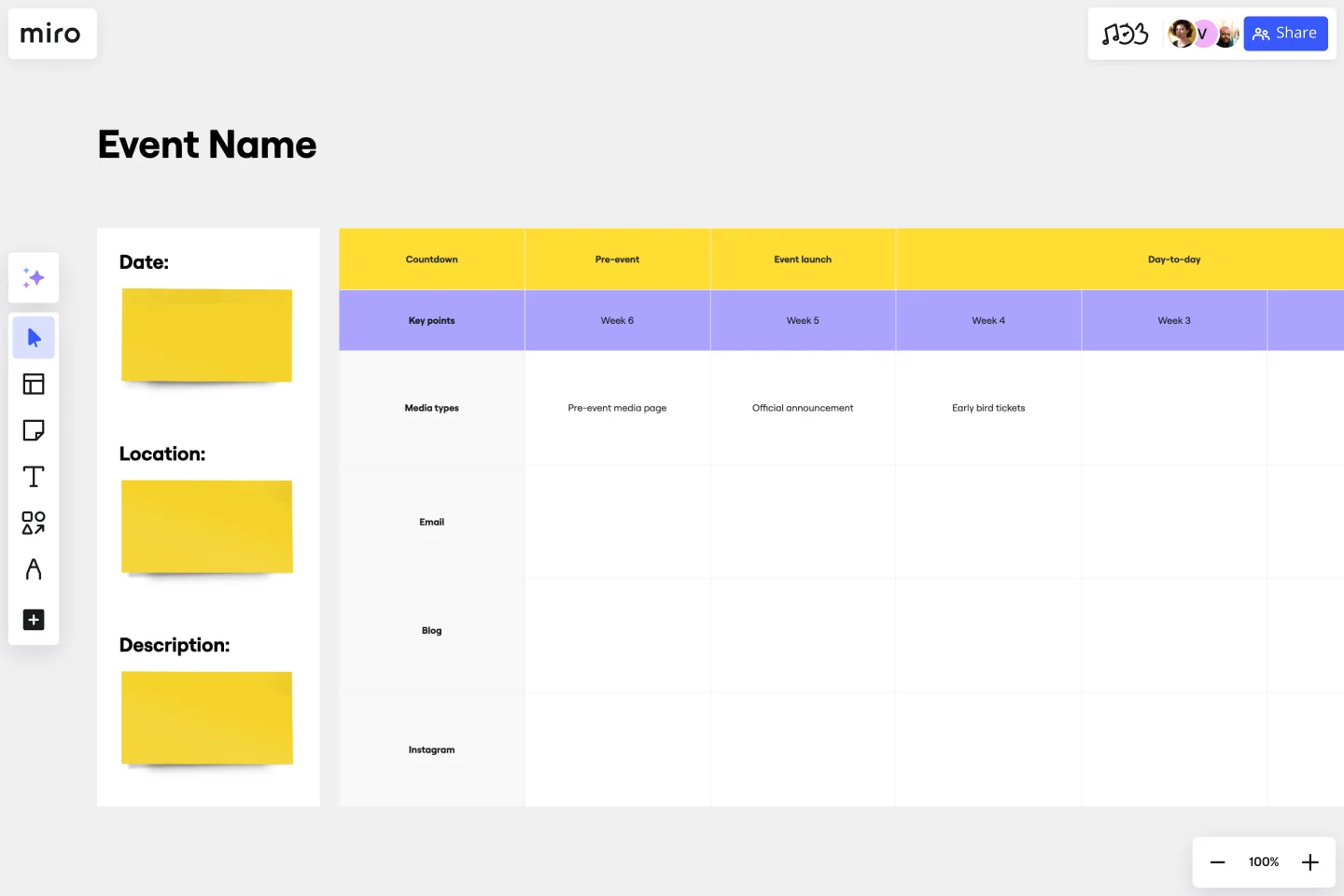Media Planning Template
Simplify your planning and pay attention to every detail with the media planning template.
About the Media Planning Template
As professionals navigate the complex world of media strategy and event planning, having a tool that promotes organization and efficient planning is essential. This is where the media planning template comes in handy. The template is divided into several intuitive sections, making it easy to grasp the information at a glance.
Event details:
Date: Specify the date of the media event or campaign. A crucial reference point as the campaign progresses.
Location: Input the venue or platform where the event will be held, ensuring all stakeholders are informed.
Description: A dedicated space to elaborate on the event's objective, target audience, or other relevant details.
Countdown sequence:
This segment allows for a systematic breakdown of the campaign's trajectory. It's organized into various phases: Pre-event, Event launch, Day-to-day run-up, and Last call.
Key Points: Beneath the countdown, there's a provision to note significant milestones for each week leading up to the event.
Media types:
An outline of the various channels or platforms employed in the campaign.
Media channels:
Email: Plan out email campaigns or communications.
Blog: Detail any blog posts or articles to be published regarding the event.
Instagram: Specify content, announcements, or promotions to be posted on this social media platform.
Each section is designed meticulously for easy understanding, ensuring strategists capture their campaign while fostering collaboration.
How to use the media planning template
Editing the template: With a few swift clicks, one can easily alter text, adjust shapes, and change predefined sections according to your needs. Use sticky notes to help you with this task.
Expansion: Do you need to expand your template? Add more rows and columns by double-clicking the plus icon.
Contextualization: Improve the planning board by adding relevant artifacts, be it images, documents, or links, ensuring all essential resources are in one place.
Why should you use a media planning template?
Efficiency: Streamlines the planning process by providing a ready-to-use structure.
Collaboration: Promotes team collaboration, allowing multiple members to view, edit, and discuss in real time.
Visualization: Offers a holistic view of the media plan, enabling easier comprehension and informed decision-making.
Flexibility: Adaptable to various media strategies, from simple to complex campaigns.
Consistency: Ensures a uniform approach to media planning across campaigns, fostering clarity and consistency.
Discover more marketing plan examples and supercharge your marketing efforts.
Can the template be customized for different types of media campaigns?
Absolutely! The template can be tailored to fit any media campaign's unique requirements.
Is the template collaborative for teams working remotely?
Yes, the template supports real-time collaboration, making it perfect for teams, regardless of their geographical location.
Is it possible to integrate external data or analytics into the template?
The template allows users to add artifacts, including external data sources and analytical reports, to provide comprehensive insights.
Get started with this template right now.
Customer Journey Map by Columbia Road
Works best for:
Customer Journey Map
The aim of the customer journey is to help you break down the customer's activities from both a front-end and back-end perspective.
Editorial Calendar Template
Works best for:
Marketing, Strategic Planning, Project Planning
If your company is like most, content is a big thing. You create more of it (and a lot faster) than you create almost anything else. It includes blogs, newsletters, social media posts, ads, and more—and it requires ideating, writing, editing, and publishing. That’s why every content team needs an editorial calendar. The template will let you easily create a calendar that empowers your team to plan strategically, keep things organized (by content type, writer, channel, and delivery date), and finalize/post all content on schedule.
Social Media Strategy Template
Works best for:
Marketing, Social Media
The Social Media Strategy Template streamlines planning, fosters efficiency and collaboration, and enables quick adjustments and optimizations to your social media campaigns. With its adaptability, you can customize the template to meet your campaign needs and respond to changing social media trends.
Go-to-Market GTM Template | Miro
Works best for:
Marketing, Desk Research, Strategic Planning
It doesn’t matter how innovative or effective a new product is — if it doesn’t get noticed and adopted by the right audience, the product won’t get off the ground. That’s where your Go-to-Market Strategy comes in. It’s a single resource that houses all of your research, insights, and data, and includes your business plan, target audience, marketing approach, and sales strategy. A GTM is especially important for any startups who grow fast, have to make split-second decisions, and have to be fully in sync.
Niching Down: Online Course Persona Empathy Map
Works best for:
Market Research, Research & Design
Niching Down Online Course Persona Empathy Map helps you tailor online courses to specific personas. By understanding their needs and motivations, you can design more effective and engaging course content. Perfect for course developers and educators.
Brand Guidelines Template
Works best for:
Design, Marketing, Documentation
What makes a strong brand? It’s having a well-defined personality, expressed with consistency at every touchpoint, and brand guidelines can help you do it. Brand guidelines are a clear list of rules—all the dos and don’ts—that cover details like colors, fonts, logo usage, photography, and brand voice. They help ensure that employees across a whole company or organization know how to display or speak about the brand. Miro’s whiteboard tool is the perfect canvas for creating brand guidelines, sharing them, and updating them.
